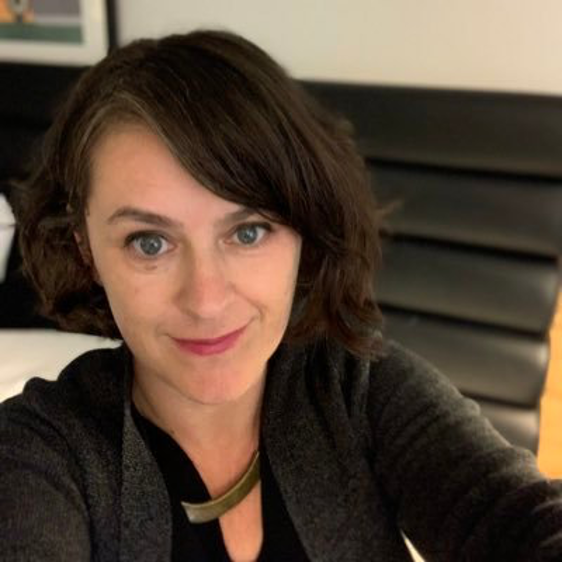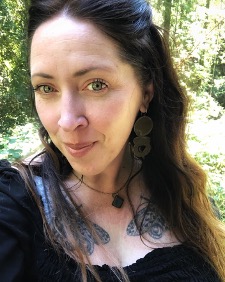

This interview has been edited for brevity and clarity.
The following is an interview with writer and voice talent Kelly Gray, and sound engineer Meredith Johnson, who collectively created an audio experience from Gray’s chapbook, My Fingers are Whales & Other Stories of Cetology, available to listen or download for free through Moonchild Press.
My Fingers are Whales & Other Stories of Cetology
Katherine Fallon: Where did My Fingers are Whales & Other Stories of Cetology begin for you? Which poem or poems opened the floodgates?
Kelly Gray: Actually, it was the first poem, On Becoming a Whale, which is fitting on many levels. While on the Mendocino Coast, I was staying at an inn that had a heavy old typewriter in my room. I was reading a lot about whale paleontology at the time. I was struck by this idea that not only are we loosing whales, but we are losing what could become of whales, something we can’t even imagine that exists in the future of evolution. I hacked out this tiny poem about whale evolution, purposefully seeing how small I could keep it, to stand in contrast to the vastness of the subject. By the time I was halfway through the pandemic, I was spending a lot of time researching and writing about whales, grief, what could have been but would never be, and my own personal lineage.
KF: Was the audio component an opportunity offered to you by the publisher, or a vision you had while writing?
KG: Almost as soon as I was done writing the poems and getting them in order, I knew that I wanted people to hear them read aloud. For me, they have a bedtime story quality, something that hopefully leads the listener into a dreamland. I am always interested in how my poems sound coming out of a mouth, far more than their form on the page. Form feels academic, whereas sound feels emotional. I lean towards emotional. Upon recording the poems, I started to hear sounds that didn’t exist yet, and that’s when I reached out to Meredith, because I thought she might be the person to find these sounds. And she did just that, and I could not be happier with her work. Moonchild Press was one hundred percent behind us diving into the audio, and we were all ecstatic to create another level of accessibility for people.
KF: How collaborative was the decision-making process? Which came first, the sound design or the collaboration?
Meredith Johnson: The collaboration came before the sound design. Kelly had the idea to release My Fingers Are Whales as a spoken piece, and she had the vision for what it could be like. She knew I had the skillset to do the sound design and we had worked together before on a much more straightforward audio version of some of her poems. As I worked, I sent her clips of sections where I was unsure, and she gave feedback. Once it was done, I sent her a draft of the entire piece and her only edit was to suggest a longer pause between two of the poems–and she was right. It did need a longer pause!
KF: Did you encounter any roadblocks in the collaborative process? How much negotiation was required?
KG: For me, very little. I know that if I am collaborating or working with someone I don’t trust, I tend to micromanage. But intuitively I knew Meredith would add all the right layers, and technically I knew she was incredibly skilled, so I shared very little direction and hoped the poems would speak for me. It was very much a ‘do with it what you will,’ because I knew she would create something magical.
MJ: I feel the same as Kelly. It was a very natural and easy collaboration. She’s a trusting and lovely collaborator.
KF: Humanity is preserved in the audio, including breaths, swallows, and a synchronicity between the two readers. How did you decide to leave these moments unedited rather than polish them out? What do you hope they provide your listeners?
MJ: Kelly’s writing is ethereal and earthy at the same time. There’s magic and humanity and nature in the work and I thought the sound of the breath felt intimate and powerful. It felt right to leave it in. I hope it makes the listeners feel like it’s the middle of the night and they are answering a strange phone call from a magical descendent of whales.
KF: Meredith, your background is in documentary studies and audio storytelling; how has this project been different than others you’ve worked on?
MJ: This project was very different from my typical work! For the past six years I have written, hosted, and produced a science podcast about human evolution. The show is in a sort of NPR style with minimal scoring and sound design. In that work I’m trying to entertain and educate people about our shared human past. And even if I feel emotional about the subject matter, I keep that work pretty cerebral. Kelly’s project was incredibly fun for me because her work has natural history woven through it and her writing is so beautiful and evocative. Her work is also about evolution, but in a different and exciting way.
KF: I respect that you didn’t overuse water or nautical sounds. What was your process in assigning audio to different poems, and to the transitions between them? Was there much trial and error involved, or were the sounds and music evident to you upon reading Kelly’s poems?
MJ: It felt like it happened intuitively and almost none of the sounds I used were ocean or whale sounds! I read all of the poems and then listened to how she read them. As I did that, ideas for sounds and emotions came to me and I gathered elements to build motifs that I wanted to repeat throughout the piece. It’s almost hard to describe, but Kelly’s writing revealed the path to take with the sound design. I knew I wanted the sound design to support the spoken word, and in my other work I’ve learned lots of tricks of the trade for doing that. I experimented with layering sounds and music in different ways and then I listened over and over again and made lots of little adjustments until the sounds felt right.
KF: Kelly, how much of My Fingers are Whales & Other Stories of Cetology is autobiographical? How do you navigate privacy and art?
KG: Much of this work is autobiographical, and some of it is pure device.
In thinking about privacy, I try to be brave with a small dose of disassociation thrown in for good measure. In all honesty, I am far more concerned about my own privacy than revealing anyone else’s shortcomings or abusive nature, especially when writing about family. Which is fucked up, right? But that is what happens when you are a survivor, you often think it is your own fault. I know this intellectually, but as a writer I have a voice that says, if you share this, people will know that you are unlovable. Which is total nonsense but…it keeps the work fresh.
When I am not being brave, which happens a lot, I say to myself, “Well, fuck, this reads like a fairytale so no one will be the wiser.” I really do use lore, science, and nature as a shield so that I can write about trauma, loss and violence. Thank you, Orca culture. How else could I write about the women in my family?
KF: As poets we are supposed to write about nature, but we are supposed to do so in entirely novel ways if we hope to be acknowledged for our writing. You manage it. How did you go about approaching the nature poem from new angles?
KG: I don’t think about sitting down to write nature poems, probably because I reject the idea of nature as a destination. It’s not a place that I intentionally want to transport the reader to. Of course, I get it, I am writing about whales and oceans and the sleeping habits of cetaceans, and I know collectively this has been labeled “nature,” but that comes from a history of colonization and “othering” the human body out of the non-human world. What I do want to write about is grief and separation that arises from this original wound of separation, which I hope can be done successfully by highlighting connection. I hope to transport readers to a fleeting feeling of recognition, maybe even connection, while flipping the constructs that keep us isolated.
KF: If you have one piece of advice for writers trying to enter the field, what would it be?
KG: Don’t worry about trying to write something that hasn’t been written by anyone before, worry about writing something you haven’t written before.
KELLY GRAY (she/her/hers) is a writer and educator residing on Coast Miwok land amongst the tallest and quietest trees in the world, exactly nine miles and seven fence posts away from the ocean. Kelly’s essay “The Falcon’s Cry” was a finalist for Best of The Net in 2020 and she has been nominated for a Pushcart Prize in fiction by Atticus Review for “Coyote Story.” Her writing appears or is forthcoming in Passages North, Pithead Chapel, Hobart, MAYDAY, Inflectionsist Review, Under a Warm Green Linden, The Normal School, Barren Magazine, Lunch Ticket and elsewhere. Her book of poetry, Instructions for an Animal Body (Moon Tide Press, 2021) and her audio micro-chap My Fingers are Whales and others stories of Cetology (Moonchild Press, 2021) are available at writekgray.com and you can follow her ramblings about all things bird, bone and human at @_west_of_west.
Meredith Johnson (she/her/hers) is an audio storyteller based in Sonoma County, California. She makes an award-winning science podcast called Origin Stories, a show about how we became human. She studied at Transom and the Duke Center for Documentary Studies.
KATHERINE FALLON received her MFA from Sarah Lawrence College and is the author of DEMOTED PLANET(Headmistress Press, 2021) and The Toothmakers’ Daughters (Finishing Line Press, 2018). Her work has appeared in AGNI, Colorado Review, Juked, Meridian, Foundry, and Best New Poets, among others. She teaches at Georgia Southern University and lives with her favorite human, who helps her zip her dresses.
